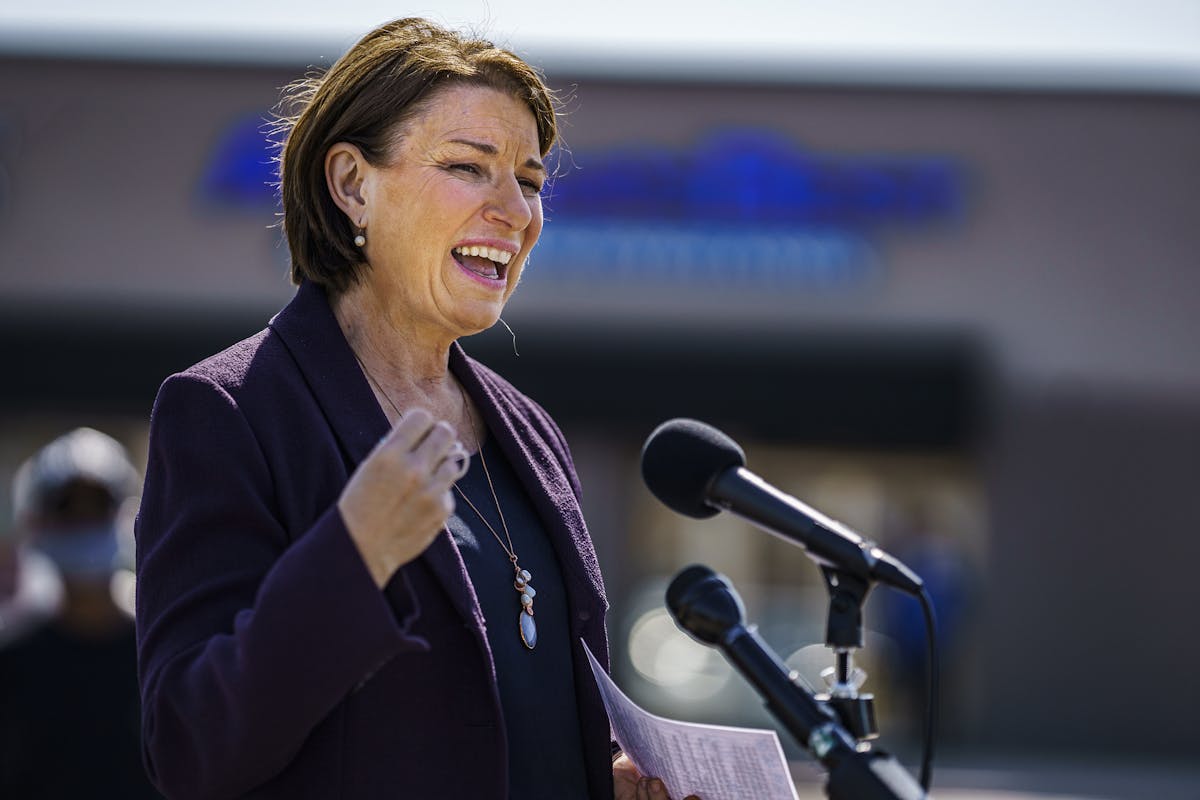WASHINGTON – A sprawling voting rights bill led by Senate Democrats survived a marathon session Tuesday of the Senate Rules Committee, chaired by Democrat Amy Klobuchar of Minnesota.
An effort to advance the legislation that touches everything from voter registration to absentee ballots and campaign finance got a party-line 9-9 tie vote in the evenly divided committee. But Senate rules allow Democrats and Majority Leader Chuck Schumer to try to bring the legislation forward to the full Senate.
Klobuchar made it clear immediately afterward that that's the plan.
"This is not the last you will hear; in fact this is the beginning," Klobuchar told lawmakers after the vote, as she pointed to the power Democrats have as the chamber's majority party.
For much of the day, the committee struggled to find major common ground on the legislation. Klobuchar said the bill, dubbed the For the People Act, would set "basic national standards" for U.S. elections. Laws being put in place by some Republican state legislatures to restrict absentee voting and early voting used in the 2020 elections have been "coordinated and overwhelming," Klobuchar said.
She described the GOP-led push in dozens of states as "real efforts to stop people from voting."
The ranking Republican on the committee, Sen. Roy Blunt of Missouri, countered that the legislation amounts to a federal takeover of elections and is a "bad bill filled with bad policies."
The partisan gridlock was clear when the committee voted along party lines after nearly two hours of debate on a package of changes Klobuchar offered. Klobuchar's amendments sought to adjust some deadlines and offer other changes designed to accommodate difficulties state and local election officials said they would have in meeting the bill's requirements.
All nine Republicans on the 18-member committee voted against Klobuchar's amendments, many saying the changes did nothing to stop the fundamental reforms with which they disagreed. Under the committee's rules, amendments that do not receive a simple majority fail.
The tie vote also signaled that Republicans wouldn't break with their party on many other potential changes. An amendment offered by Republicans to do away with a national standard for early voting died in a partisan tie. So, too, did Democrats' offer to shorten the time window for early voting.
While the conversation was generally civil, the dysfunction of Congress was sometimes on full display. Schumer, a rules committee member, said recent state restrictions on absentee voting "carry the stench of oppression" and the "smell of bigotry." He said state legislators' explanation that the new laws are necessary to fight voter fraud fed former President Donald Trump's discredited claims that he lost the 2020 election because of widespread voter fraud.
Senate Minority Leader Mitch McConnell of Kentucky, also on the committee, disputed that the Democrats' voting rights bill was a "racial justice bill." He said criticisms that the new Georgia law targeted people of color who voted in record numbers by absentee ballot in 2020 had been "debunked."
An amendment by Georgia's newly elected Democratic senator, Jon Ossoff, to overcome his state's new law that makes it illegal to give food and drink to people waiting in line at the polls died in a 9-9 vote.
Some GOP amendments did make it into the bill, including one approved on a 10-8 vote from Mississippi Sen. Cindy Hyde-Smith that she said would "add an exception to the bill so that states can prevent felons convicted of crimes against children from voting." Klobuchar was successful in adding a requirement for the attorney general to issue a report dealing with personal data and cybersecurity needs, as well as a change with West Virginia Republican Sen. Shelley Moore Capito focused on electronic ballot returns for voters with disabilities as well as those in the military and overseas.
Still, other moments of tension surfaced. In one exchange, GOP Sen. Ted Cruz claimed the intent of the bill was to "register millions of illegal immigrants."
Democratic Sen. Jeff Merkley of Oregon, a lead sponsor of the bill along with Schumer and Klobuchar, challenged Cruz to provide proof. When he didn't, Merkley called Cruz's contention "a falsehood."
Cruz and Klobuchar also clashed later in the hearing, showing the lingering tensions from both the 2016 and 2020 elections, as well as the Jan. 6 Capitol insurrection.
After Cruz attacked the bill as "a brazen power grab," where Democrats "want to fix the game," Klobuchar called out Cruz for leading the GOP's challenge of electoral college results.
"And so you wonder why we want to make sure that people have the right to vote. Well, it's because of this kind of rhetoric and this kind of behavior and an insurrection at the Capitol and a former president that is still maintaining that he somehow won the election when we all know it's not true," Klobuchar said.
While the House passed its own version of the package in March with no GOP votes, the legislation's path through the Senate is far more difficult. The filibuster looms as a major challenge to the bill's chances of ever passing out of the chamber, and Democrats lack enough support to change that 60-vote threshold for most legislation.
